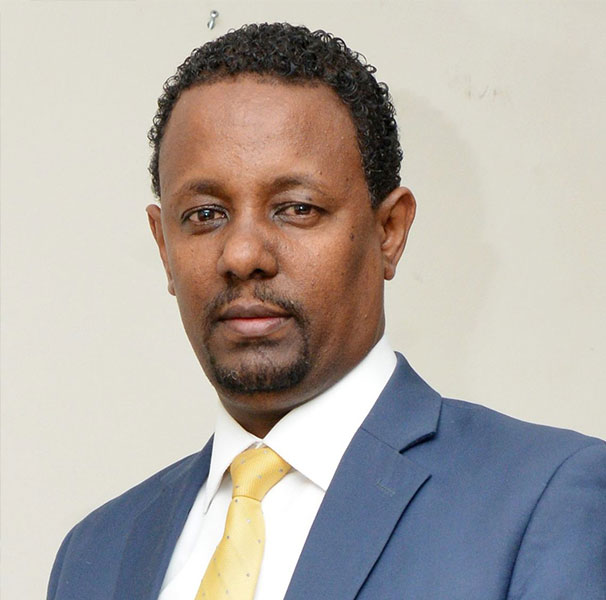
Radar |
May 23 , 2020
By MAYA MISIKIR ( FORTUNE STAFF WRITER )
Employees from the East Addis District of Bank of Abyssinia have donated food supplies worth close to half a million Birr to various low-income households most impacted by the Novel Coronavirus (COVID-19).
The employees, from 93 branches, made contributions of flour, spaghetti, edible oil and dates for followers of the Muslim religion. The 1,300 employees mobilised the funds following the call of the Addis Abeba City Administration.
"It's a part of our responsibility as citizens, and we believe that we can reach many people if we all share what we have," said Elias Kassa, the Bank's East Addis District manager.
The Bank has made these donations throughout 10 weredaslocated in Bole, Kirkos and Bole districts as well as in North Shoa Zone and Debre Berhan town.
The donation to Yeka District is worth 157,000 Br in terms of pasta and flour, according to Tesfaye Shiferaw, the District's communications office director. Yeka District, which has 86 food banks under 14 weredas, started mobilising a week after the onset of COVID-19 in the country and has so far collected different food items worth 47.3 million Br.
The donated food will then be distributed to low-income households after the current study is finalised. The assessment has been underway for over two months by the joint efforts of the District's village participatory management office, its youth and volunteer coordination and its labour and social affairs office.
"The District has an estimated 47,000 people in need of support, and we're working on assessing the accuracy of this figure and the support they will require," said Tesfaye. "We donated a sheep, a box of dates and 20Kg of flour to each of 216 followers of the religion in the District as support for the Eid al-Fitr holiday."
The donations were based on the willingness and ability of each employee, according to Girma Nigussie, planning and monitoring officer for the East Addis District section of the Bank.
"We're thinking about how to be supportive in this time and eventually decided on food donations," he said. "We thought food would make a more direct impact, and it is more fulfilling for us. The food banks under each district had also made it much simpler to go for this option."
Employees of the Bank of Abyssinia in Meqelle, Jimma and Hawassa branches have also contributed to the cause by providing washing stations and providing cash assistance.
The main aim of food banks is to provide accessibility so making donations to them was a good solution toward alleviating food insecurity that may be caused by COVID-19, according to Messay Mulugeta, (PhD) associate professor of socioeconomic development and food security at Addis Abeba University.
"We should work toward creating a legal framework for the establishment and management of food banks," he said. "If that's the case, people will have proper institutions where they can share what they have."
The expert also stated that food banks are more efficient than cash donations as a means of reaching people, as they are less likely to be misappropriated.
PUBLISHED ON
May 23,2020 [ VOL
21 , NO
1047]

Radar |

Fortune News | Jul 11,2021

Fortune News | Jan 02,2021

Radar | Feb 25,2023

Radar | May 14,2022

Radar | May 04,2019

Radar | Dec 24,2022

Radar | Apr 02,2022

Fortune News | Sep 01,2024

Radar | Dec 04,2022

Dec 22 , 2024 . By TIZITA SHEWAFERAW
Charged with transforming colossal state-owned enterprises into modern and competitiv...

Aug 18 , 2024 . By AKSAH ITALO
Although predictable Yonas Zerihun's job in the ride-hailing service is not immune to...

Jul 28 , 2024 . By TIZITA SHEWAFERAW
Unhabitual, perhaps too many, Samuel Gebreyohannes, 38, used to occasionally enjoy a couple of beers at breakfast. However, he recently swit...

Jul 13 , 2024 . By AKSAH ITALO
Investors who rely on tractors, trucks, and field vehicles for commuting, transporting commodities, and f...

Jun 28 , 2025
Meseret Damtie, the assertive auditor general, has never been shy about naming names...

Jun 21 , 2025
A well-worn adage says, “Budget is not destiny, but it is direction.” Examining t...

Jun 14 , 2025
Yet again, the Horn of Africa is bracing for trouble. A region already frayed by wars...

Jun 7 , 2025
Few promises shine brighter in Addis Abeba than the pledge of a roof for every family...